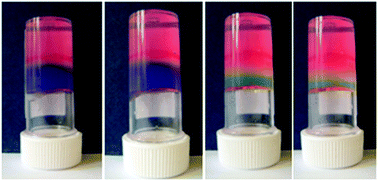Salt can induce gelation of functionalised dipeptides at high pH, say a team of scientists from the UK and France. The finding will significantly expand the utility of hydrogels, they claim.
Hydrogels are formed when molecules assemble into nanofibres, which then entangle and form a gel matrix. They can be used for a variety of applications, including drug delivery and scaffolds for tissue engineering. Peptide-based gelators are of particular interest at present, in part because they are potentially biocompatible.
Gelation is commonly triggered by pH, temperature or solvent composition. Dave Adams, at the University of Liverpool, and colleagues discovered that functionalised dipeptides that adopt a worm-like micelle structure at high pH form gels when salts are added to them. High pH is normally outside the window for gelation so the finding could be very useful for the field. Importantly, now that these gels can be made at physiological pH, they should find increased use in bioapplications.
Read more in Adams’ ChemComm communication, free to access for a limited period.











